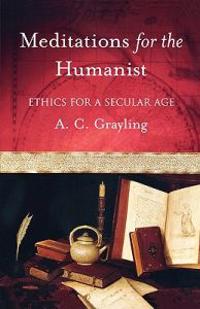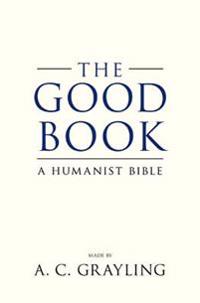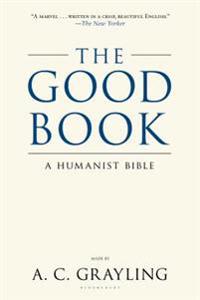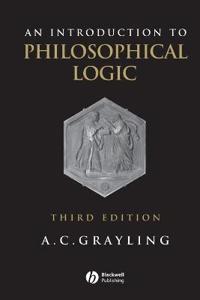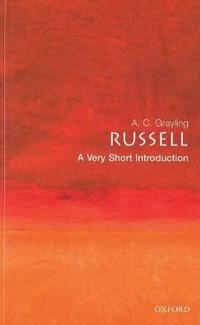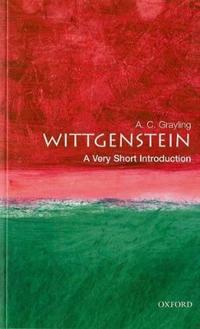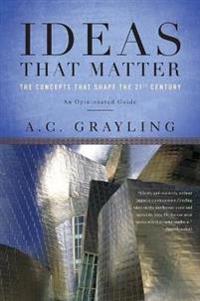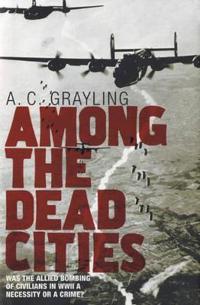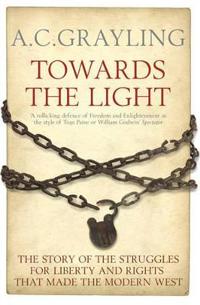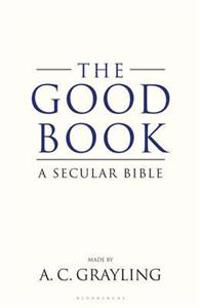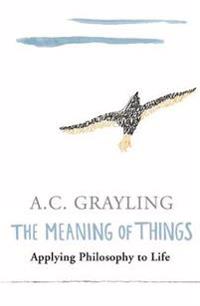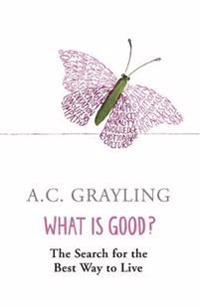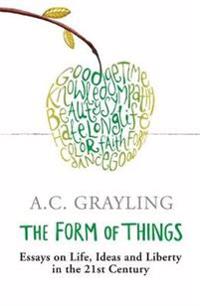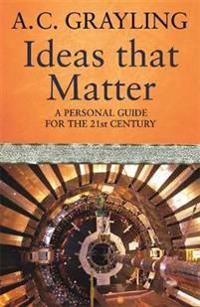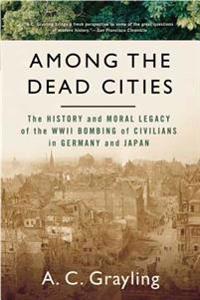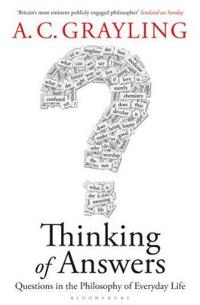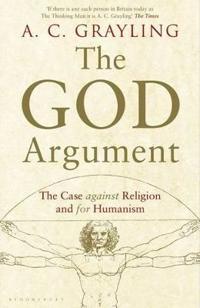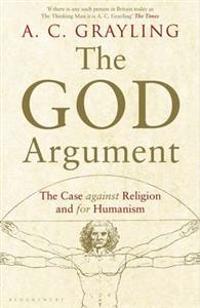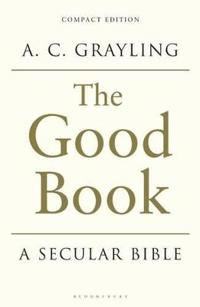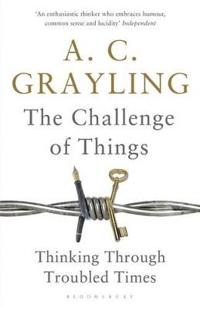Meditations for the Humanist: Ethics for a Secular Age (Häftad)
avA. C. Grayling
ISBN: 9780195168907 - UTGIVEN: 2003-12The Good Book: A Humanist Bible (Häftad)
avA. C. Grayling
ISBN: 9780802778376 - UTGIVEN: 201303Drawn from the wealth of secular literature and philosophy in both Western and Eastern traditions, using the same techniques of editing, redaction, and adaptation that produced the holy books of the Judeo-Christian and Islamic religions, "The Good Book" consciously takes its design and presentation [...]
An Introduction to Philosophical Logic (Häftad)
avA. C. Grayling, Anthony C. Grayling
ISBN: 9780631199823 - UTGIVEN: 200105"An Introduction to Philosophical Logic" is a popular mainstay for students taking courses in philosophical logic and the philosophy of language. Covering some of the most central topics in philosophy - the proposition, theories of truth, existence, meaning and reference, realism and anti-realism - [...]
Russell (Häftad)
avA. C. Grayling
ISBN: 9780192802583 - UTGIVEN: 200202Bertrand Russell (1872-1970) is one of the most famous and important philosophers of the twentieth century. In this account of his life and work A.C. Grayling introduces both his technical contributions to logic and philosophy, and his wide-ranging views on education, politics, war, and sexual mora[...]
Wittgenstein (Häftad)
avA. C. Grayling
ISBN: 9780192854117 - UTGIVEN: 200102Ludwig Wittgenstein (1889-1951) was an extraordinarily original philospher, whose influence on twentieth-century thinking goes well beyond philosophy itself. In this book, which aims to make Wittgenstein's thought accessible to the general non-specialist reader, A. C. Grayling explains the nature an[...]
Friendship (Pocket)
avA. C. Grayling
ISBN: 9780300205367 - UTGIVEN: 2014-10A central bond, a cherished value, a unique relationship, a profound human need, a type of love. What is the nature of friendship, and what is its significance in our lives? How has friendship changed since the ancient Greeks began to analyze it, and how has modern technology altered its very defini[...]
Ideas That Matter: The Concepts That Shape the 21st Century (Häftad)
avA. C. Grayling
ISBN: 9780465025213 - UTGIVEN: 201201Ideas can, and do, change the world. Just as Marxism, existentialism, and feminism shaped the last century, so are fundamentalism, globalization, and bioethics transforming our world now. In "Ideas That Matter," renowned philosopher A. C. Grayling provides a personal and heartfelt guide to the ideas[...]
Among the Dead Cities (Inbunden)
avA. C. Grayling
ISBN: 9780747576716 - UTGIVEN: 2006-02In the course of WWII, the air forces of Britain and the United States of America carried out a massive bombing offensive against the cities of Germany and Japan, ending with the destruction of Hamburg and Dresden, Tokyo, Hiroshima and Nagasaki. Was it justified by the necessities of war? Or was it,[...]
Among the Dead Cities (Häftad)
avA. C. Grayling
ISBN: 9780747586036 - UTGIVEN: 2007-02Britain and the USA carried out a massive bombing offensive against the cities of Germany and Japan in the course of the Second World War, which ended with the destruction of Hamburg, Dresden, Tokyo, Hiroshima and Nagasaki. Was the bombing of civilian targets justified by the necessities of war? Or [...]
Towards the Light (Häftad)
avA. C. Grayling
ISBN: 9780747592990 - UTGIVEN: 2008-09The often-violent conflicts of the fifteenth and sixteenth centuries were sparked by the pursuit of freedom of thought. In time, this drive led to bitter fighting, including the English Civil War. Then came revolutions in America and France that swept away monarchies for more representative forms of[...]
The Good Book (Inbunden)
avA. C. Grayling
ISBN: 9780747599609 - UTGIVEN: 201104Designed to be read as narrative and also to be dipped into for inspiration, encouragement and consolation, The Good Book offers a thoughtful, non-religious alternative to the many people who do not follow one of the world's great religions. Instead, going back to traditions older than Christianity,[...]
The Meaning of Things (Storpocket)
avA. C. Grayling
ISBN: 9780753813591 - UTGIVEN: 200207'The unconsidered life is not worth living' ' Socrates. Thinking about life, what it means and what it holds in store does not have to be a despondent experience, but rather can be enlightening and uplifting. A life truly worth living is one that is informed and considered so a degree of philosop[...]
What is Good? (Storpocket)
avA. C. Grayling
ISBN: 9780753817551 - UTGIVEN: 2004-02One of the most fundamental questions in our life is to find out what we value - what principles we want to live by and which codes we will use to guide our behaviour. Most of us want to live a good life. But what, in today's secular society, does 'good' actually mean? To classical Greeks, the acqui[...]
The Form of Things (Storpocket)
avA. C. Grayling
ISBN: 9780753822234 - UTGIVEN: 200710'Grief and loneliness, depression, despair and failure - those things are the common human lot at least at times in all our lives'. Yet it is philosophy which, while not providing an answer to these problems, can enable us to prepare for them, and create strategies with which to deal with them. It i[...]
Ideas That Matter (Storpocket)
avA. C. Grayling
ISBN: 9780753826188 - UTGIVEN: 2009-02Leading philosopher's guide to the ideas that will shape the 21st century 'Ideas are the cogs that drive history, and understanding them is half way to being aboard that powerful juggernaut rather than under its wheels'. This is a book that celebrates the power of ideas: thought can, and does, chang[...]
Among the Dead Cities: The History and Moral Legacy of the WWII Bombing of Civilians in Germany and Japan (Häftad)
avA. C. Grayling
ISBN: 9780802715654 - UTGIVEN: 2007-03Presents an analysis of the miltary rationale used by Britain and the United States for bombing civilian targets in Germany and Japan during World War II, discussing the reasons why such tactics were both largely ineffective and morally reprehensible. Reprint. 20,000 first printing.[...]
The Wiley Blackwell Handbook of Humanism (Häftad)
avAndrew Copson, A. C. Grayling
ISBN: 9781119977179 - UTGIVEN: 2015-05-31Thinking of Answers (Inbunden)
avA. C. Grayling
ISBN: 9781408805985 - UTGIVEN: 2010-03The essays in this book, drawn mainly from A. C. Grayling's columns in Prospect, the Dubliner and The Times, are in fact responses to questions set by editors and readers. If beauty existed only in the eye of the beholder, would that make it an unimportant quality? Are human rights political? Can et[...]
The God Argument (Inbunden)
avA. C. Grayling
ISBN: 9781408837405 - UTGIVEN: 201303There has been a bad-tempered quarrel between defenders and critics of religion in recent years. Both sides have expressed themselves acerbically because there is a very great deal at stake in the debate. This book thoroughly and calmly examines all the arguments and associated considerations of[...]
The God Argument (Häftad)
avA. C. Grayling
ISBN: 9781408837412 - UTGIVEN: 201303There has been a bad-tempered quarrel between defenders and critics of religion in recent years. Both sides have expressed themselves acerbically because there is a very great deal at stake in the debate. This book thoroughly and calmly examines all the arguments and associated considerations of[...]
The Good Book (Inbunden)
avA. C. Grayling
ISBN: 9781408837832 - UTGIVEN: 201303The Good Book is a book of insight, inspiration, wisdom, solace and commentary on the human condition drawn from the great humanist traditions of thought and literature of the world. Its princi-pal concern is how life - the good life - should be lived. Stimulating, thoughtful, rational and rewarding[...]
The Challenge of Things (Inbunden)
avA. C. Grayling
ISBN: 9781408864616 - UTGIVEN: 2015-03A. C. Grayling's lucid and stimulating books, based on the idea that philosophy should engage with the world and make itself useful, are immensely popular. The Challenge of Things joins earlier collections like The Reason of Things and Thinking of Answers, but this time to collect Grayling's recent [...]
Among the Dead Cities (Häftad)
avA. C. Grayling
ISBN: 9781472526038 - UTGIVEN: 2014-04Is it ever right to target civilians in a time of war? Or do the ends sometimes justify the means? The twentieth century - the age of 'total war' - marked the first time that civilian populations came to be seen as legitimate military targets. At this policy's most terrible extreme came the dropping[...]

